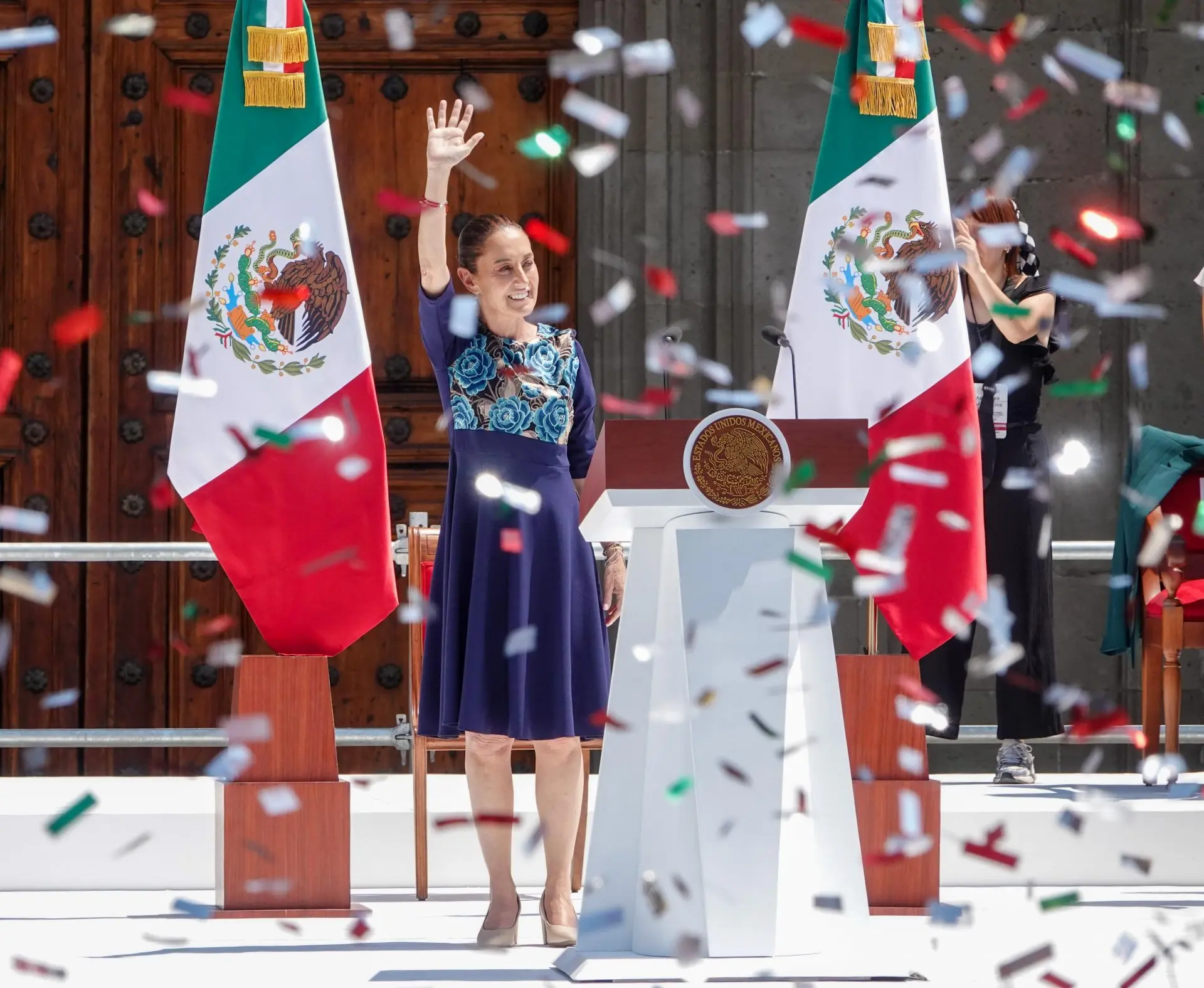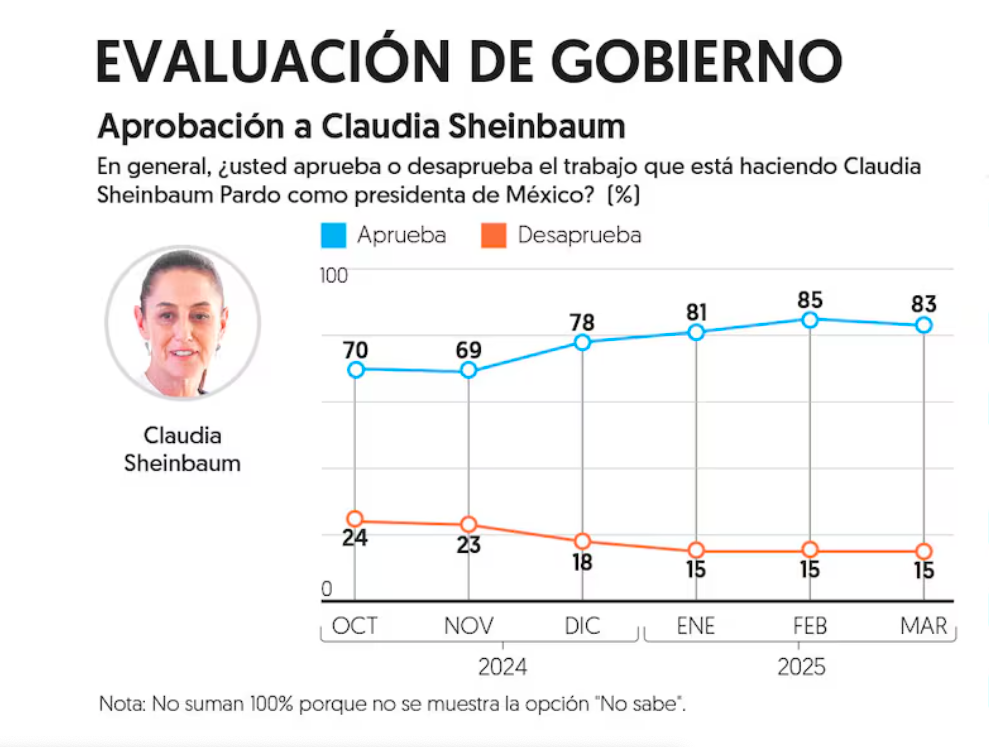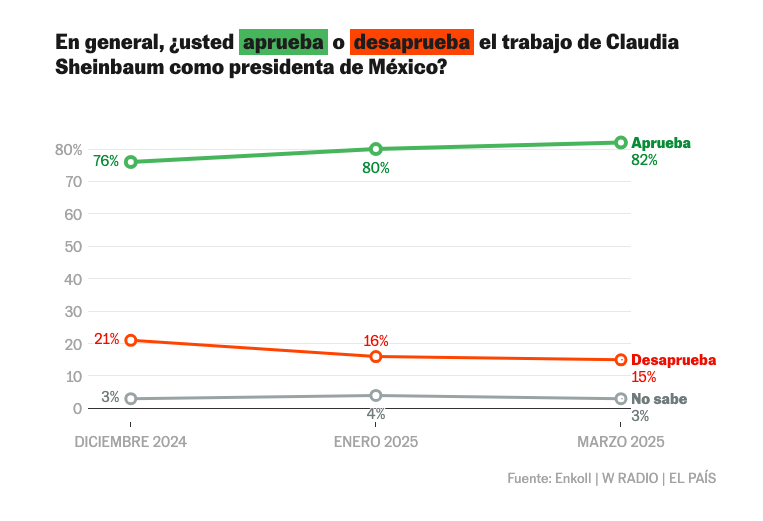
When Nayyib Bukele asked Grok, X’s artificial intelligence tool, who is the most popular president in all the world, it’s answer turned the El Salvadorian President into the disappointed witch whose magic mirror tells her, “No, you are not the fairest in all the land.” It turns out, in 2025, Bukele’s Snow White is none other than Mexican President Claudia Sheinbaum.
This sentiment is not only confirmed by the ensuing memes: polls confirm that, with nearly 60% of the vote, since June Claudia Sheinbaum has been riding a popularity wave after winning the presidency by the largest margin since Miguel de la Madrid won in 1982. During Madrid’s victory, the PRI was the dominant party and controlled the elections. Fraud was a staple of the system. In recent months, Sheinbaum has gained a level of popularity unmatched by any of her predecessors, including her party colleague Andrés Manuel López Obrador.
The British elite newspaper The Financial Times identifies a rising trend in the polls among the most visible leaders who have had to face the challenges posed by Donald Trump: France’s Emmanuel Macron; Britain’s Keir Starmer; Canada’s Justin Trudeau and Mark Carney; and Ukraine’s Volodymyr Zelensky, in addition to Sheinbaum.
Of this sextet, the Mexican President is by far the most advanced, with a rise in her net approval rating (approval minus disapproval) from 60% to 70%, while the next leader is Zelensky, with less than 40%.
Poll after poll confirms this impressive performance: those by newspaper El Financiero, which takes a critical stance from a business perspective, show sustained growth in presidential approval from 69% in November to 83% in March, while the polls by the Spanish newspaper El País and Enkoll show 76% in December, 80% in January, and 82% in March.


Factors of the “Claudia Effect”
“Mexico’s leftist president, Claudia Sheinbaum, was expected to clash with Trump,” the Financial Times reasons to explain Sheinbaum’s spectacular performance, “but the country’s first female leader has won praise for a cool-headed approach.”
El Financiero’s statistician Alejandro Moreno, attributes this to a number of elements, of which “the closing of ranks around the president in the face of the Trump factor” is just one.
Beyond the reasons for this rise, the question is: What good can such significant support do for Sheinbaum?
The internal and external challenges are significant, and she will have to be cautious when investing her assets—but not cease to invest them.
Externally, She Has Room to Maneuver
The greatest uncertainty comes, obviously, from Donald Trump. Observers both inside and outside recognized the Mexican president’s ability to contain, at least temporarily, several threats of a tariff war, which even earned her praise from the U.S. president on several occasions, to the point that he described her as a “wonderful woman” (in contrast to the disdain he displayed toward Canadian leaders).
But it could be that this very Wednesday, April 2, things will change. Trump has called this day “Liberation Day” because he will take his trade war to the entire world. If Mexico doesn’t receive significantly better treatment (or less mistreatment) than Canada and the European allies, and if excessively burdensome tariffs are imposed, there will also be a question of how soon Sheinbaum manages to lighten or eliminate them.
Popular support, in any case, gives the Mexican president solidity and expands her room for maneuvering. She has won over not only voters but also the business sector, which (although its preferences are for conservative parties) recognizes that only Sheinbaum and her team can safeguard their interests. They are offering their support and have shown themselves to be receptive to the possibility that she might ask them to accept a certain level of economic pain to prevent maximum harm.
Opportunists On The Attack
However, it seems clearer how the president will be able to invest her popularity on the foreign front than on the domestic one. Although a careless observer might perceive her as hegemonizing all power, with a coalition that controls overwhelming majorities in the Federal Congress as well as almost all states, in reality, she doesn’t hold all the strings in her hand, and some of her allies secure significant margins of autonomy.
Although Sheinbaum’s Morena party represents a left-leaning ideological movement, both it and its coalition with the Labor and Green Ecologist parties are the most important avenues for access to public office and are rife with opportunists. Furthermore, since Sheinbaum’s selection as a candidate left several of her competitors dissatisfied, then-President López Obrador appeased them and compensated them by distributing significant amounts of power, which they are now trying to use to condition the president.
The most prominent are two politicians who lead strong interest groups without a leftist ideological vocation: former governor of Zacatecas state Ricardo Monreal, coordinator of the Morena deputies, and former governor of Tabasco Adán Augusto López, leader of the party’s senators. From their positions, they can accelerate, qualify, hinder, and even derail important initiatives for the federal government, in addition to promoting their own.
Sheinbaum Magnet
The growth in popularity, however, gives Sheinbaum new strength. From certain perspectives, she owed everything to López Obrador, and now she has her own profits and legitimacy, with recognition that is not only national and extends beyond her political sector but also internationally, even to Donald Trump.
Her management style is proving effective, persuasive, and unifying. Furthermore, like a judo fighter, the president seems to be taking advantage of the pressure applied by Trump to move things forward within the country, such as in the area of public security.
There were practically no qualms, for example, when, to appease the White House, she broke procedural locks that had protected certain crime bosses for years and decades, which other presidents had been unable or unwilling to overcome. In a single day, she unexpectedly sent 29 major criminals to the United States in handcuffs, many of whom had continued to operate their networks from the safety of prison. Some of them could even be sentenced to death, which would not be permitted if they had been handed over under the terms of the current bilateral extradition treaty. But if that happens, that will be a topic for another time. For now, the gift was appreciated by her U.S. counterpart.
In security, the economy, and other areas—such as unionism, labor rights, and the environment—the president can continue to use Trump’s power to overcome resistance and push through profound changes that would otherwise be very complicated.
But her popularity should also serve to restore order within her own movement, as well as among its controversial allies, such as the Green Ecologist Party, which is not a party, neither green nor environmentalist, but a franchise of power-hungry individuals, a partner as reliable as a seller of secrets.
Morena’s power is capable of achieving profound transformations, but at the same time, it is vulnerable to internal intrigue and underhand betrayals. Sheinbaum has become a magnet in her own right, however, which should make schemers feel the risk of ending on the wrong polarity.
Related: Analysis: How the judicial system necessitated its own reform